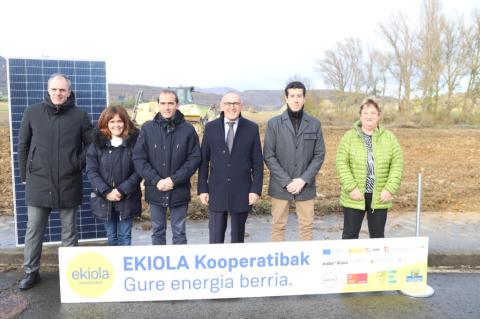EKIOLA: Energy community Citizens involvement

About this good practice
Basque Country had the need to promote energy communities in the territory.
Therefore, the origin is not a social project but rather the implementation of EC, but in the process the need for citizen acceptance has been seen.
To achieve this objective, EVE (Basque Energy Agency) and KREAN created EKIOLA.
Each EKIOLA project has different peculiarities in each region, but the main start-up procedure is similar in all of them. First, it begins with the creation of the Ekiola company to carry out the EC.
Then, it is necessary to approach the area, with local/regional authorities and detail the distribution of tasks (different in each region). Always with the participation of city councils (to a greater or lesser extent). The collaboration of the town councils is indirect (e.g.: information offices with their own staff, endorsement of the connection to the electrical grid)
EKIOLA promotes sustainable rural areas and communities: EKIOLA promotes a consumer-centric energy scheme, where consumers are producers at the same time. The new solar PV plants are installed in urban areas, producing Km0 renewable electricity. The citizens are prioritized as members of the energy community that will be also open to the participation of local administration and business.
EKIOLA promotes responsible consumption and production: Each member of the EC covers 100% of the electricity demand from a local PV plant. Thus, each participant purchases only the PV panels required to meet the demand.
Expert opinion
Resources needed
- The minimum required participants to develop an EC is 400 citizens. However, is not always easy to involve so many citizens.
- Info points in each municipality.
- Each MW requires approximately 1 hectare of land.
- Aid has been requested to finance the projects (state, Basque Government, etc.).
Evidence of success
Main results of the good pratice are to produce sustainable energy, in a cooperative way where citizens are the owners of the project. Another result is to put consumers at the heart of the energy transition by converting them into Prosumers.
EKIOLA demonstrated its potential for replication when it create Azpeitia´s EKIOLA, where 570 citizens signed-up in it.
There are 15 cooperatives established and 2 installations with grid injection. And in all of them they are working on socialization
Potential for learning or transfer
- A huge challenge is to select the appropiate site for the PV plant because of the high density region. It covers an area of 7,234 sq.km and a population of 2,2M inhabitants.
- Another challenge is the social acceptance of PV plants. But, EKIOLA´s advantage is that citizens are part of the project (non-profit entity) so they take advantage of it.
- The acceptance of smaill PV plants is better.
- For financing, agreements have been reached with different financial entities so that members can request loans, with advantageous conditions.
- Importance of the social aspect: Socialization requires experts in social matters.
- The involvement of local entities (so that the inhabitants consider the project close)
Ways to promote citizen involvement:
• Agreement between EKIOLA and the municipality interested in developing a local EC.
• Create info points in each municipality and training technicians.
• Support the EC in getting the funding and/or subsidies required for the implementation.
Further information
Good practice owner
You can contact the good practice owner below for more detailed information.

